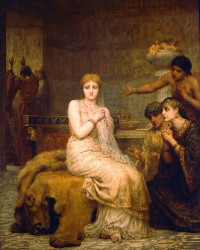are you a vashti or an esther feminist?

Today is International Women’s Day, an occasion to peer back through history and say, ‘Gosh, we’ve come a long way!’ I guess it’s a day to say thanks, fellas, for letting us vote, wear trousers and earn a decent wage. You’re so good to us (sorry, I couldn’t resist).
But it’s also worth considering what feminism means, now that we’ve got a woman as PM, not to mention a Governor General (tick), women can serve in frontline combat roles (tick), and workplaces are being encouraged to provide flexible work arrangements so that mum can carry on with her career (tick).
We’ve got it good in Australia – still lots to be done in places like India, the spate of horrific rape-murder cases being the most chilling kind of reminder.
But what is feminism? What does it mean to you?
We’re not likely to agree on this one, probably because women’s liberation in Australia is no longer about tangible imperatives like the right to vote and access to a fair pay. Today it’s about ambiguous words like choice and empowerment and freedom. I would question the method and motivation behind modern feminism. Not to say this is always the case, but it often smacks of individualism.
By way of example, allow me to introduce you to two women who lived around 480BC, both serving as queen to King Xerxes who ruled over 127 provinces stretching from India to Cush (the upper Nile region). Needless to say, women’s rights were a foreign concept.
Vashti was his first queen, demoted for the offense of refusing to be summonsed when the King wished to ‘display her beauty to the people’. It seems Vashti got jack of the King’s womanising ways and took a stand that cost her dearly.
Esther was next, recruited to the King’s harem for her good looks and soon instated as Queen, such was her allure. Feminists have criticised Esther, an orphan, for being craven to figures of paternity: firstly her cousin and guardian Mordecai who called the shots early on, then to her husband the King.
But reading about this intriguing wedge of history (or should that be herstory?) we see that Queen Esther got wind of a plot by the king’s 2IC to rid the kingdom of Jews. Our young Queen hosted a series of dinners, captivating her King and finally drawing his attention to the devastating effects of handing power to such an unsavory bloke. She saved her people, the Jews.
Vashti preserved her pride (individualism); Esther saved her people (community).
There’s a line in the historical account of Esther (found in the Bible) that snagged in my mind, a few words of advice from Mordecai.
“…Who knows but that you have come to your royal position for such a time as this?” (Esther 4:14).
Vashti may have made a bold statement in her exit from the king’s favour, but Esther did something far more admirable. She was prepared to sacrifice everything, life and position, for her people. Similarly, feminism is a worthy cause, but it should not supersede basic values of love, courage, integrity and wisdom.
International Women’s Day is a 24-hour reminder of the activism and conviction that led to the freedoms we enjoy today. It’s not a battle of the sexes.
If, like me, you identify with some of the tenets of feminism it’s worth considering whether you are a Vashti or an Esther. We sure could do with some more Esthers, using their “royal positions” for positive change in the community.
By Claire van Ryn
Read more of Claire’s musings at faithlikeamushroom.wordpress.com.

